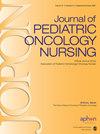沉浸式虚拟现实干预解决儿童和青少年癌症患者心理健康的可行性、可接受性和临床实施。
IF 1.9
3区 医学
Q2 NURSING
引用次数: 28
摘要
目的:虚拟现实(VR)是一种新颖的高度沉浸式技术,为解决癌症治疗和住院治疗的潜在心理影响提供了希望。本研究的主要目的是检查沉浸式VR治疗干预用于住院癌症患者的可接受性和可行性的多个关键用户观点。次要目的是确定在儿科肿瘤学环境中采用和临床实施VR相关的问题和机会。方法:研究在澳大利亚墨尔本皇家儿童医院(RCH)进行。30名多学科肿瘤学卫生保健专业人员参加了VR干预可用性的初始测试(第一阶段)。90名肿瘤住院患者(7-19岁)及其父母护理人员参加了一项试点随机对照研究,以检验沉浸式VR治疗干预的有效性(第二阶段)。该混合方法研究报告了第一阶段和第二阶段与VR可行性和可接受性相关的定量和定性数据。结果:结果表明,卫生保健专业人员对VR的易用性和有用性有良好的看法,并有积极的意向在未来使用它。家长看护人员报告了他们住院儿童对VR的高接受度。患者报告了VR干预的高满意度和最小的不良反应。对患有严重疾病的儿童使用VR的障碍和促进因素以及对内容开发的具体建议进行了归纳。结论:本研究表明,除了医疗程序分心之外,沉浸式VR干预在支持住院和患者生活质量的心理调整方面还有几个潜在的临床应用。本文章由计算机程序翻译,如有差异,请以英文原文为准。
Feasibility, Acceptability, and Clinical Implementation of an Immersive Virtual Reality Intervention to Address Psychological Well-Being in Children and Adolescents With Cancer.
Objective: Virtual reality (VR), a novel and highly immersive technology, offers promise in addressing potential psychological impacts of cancer treatments and hospitalization. The primary aim of this study was to examine multiple key user perspectives on the acceptability and feasibility of an Immersive VR therapeutic intervention for use with hospitalized patients with cancer. Secondary aims were to identify issues and opportunities related to the adoption and clinical implementation of VR in pediatric oncology settings. Method: The study was conducted at The Royal Children’s Hospital (RCH), Melbourne, Australia. Thirty multidisciplinary oncology health care professionals participated in an initial test of VR intervention usability (Stage 1). Ninety oncology inpatients (7-19 years) and their parent caregivers participated in a pilot randomized controlled study to examine the effectiveness of an Immersive VR therapeutic intervention (Stage 2). This mixed methods study reports Stages 1 and 2 quantitative and qualitative data related to VR feasibility and acceptability. Results: Results indicate favorable perceptions from health care professionals with respect to ease of use and usefulness of VR, and had positive intentions to use it in the future. Parent caregivers reported high acceptability of VR for their hospitalized child. Patients reported high satisfaction of the VR intervention within minimal adverse effects. Barriers and facilitators to VR use with seriously ill children and specific recommendations for content development were elicited. Conclusion: This study shows that there are several potential clinical uses for Immersive VR intervention, beyond medical procedural distraction, to support psychological adjustment to hospitalization and patient quality of life.
求助全文
通过发布文献求助,成功后即可免费获取论文全文。
去求助
来源期刊
CiteScore
3.10
自引率
0.00%
发文量
0
审稿时长
>12 weeks
期刊介绍:
SPECIAL PATIENTS NEED SPECIAL NURSES
Caring for children with cancer is one of the most technically and emotionally difficult areas in nursing. Not only are you dealing with children and adolescents who hurt, you must reassure and educate families, balance a multitude of other health care professionals, and keep up with ever-changing nursing practice and care. To help special nurses stay aware of the newest effective nursing practices, innovative therapeutic approaches, significant information trends, and most practical research in hematology and pediatric oncology nursing, you need the Journal of Pediatric Oncology Nursing.
The journal offers pediatric hematology, oncology, and immunology nurses in clinical practice and research, pediatric social workers, epidemiologists, clinical psychologists, child life specialists and nursing educators the latest peer-reviewed original research and definitive reviews on the whole spectrum of nursing care of childhood cancers, including leukemias, solid tumors and lymphomas, and hematologic disorders. JOPON covers the entire disease process--diagnosis, treatment, recovery, and survival, as well as end-of-life care.
Six times a year, the Journal of Pediatric Oncology Nursing introduces new and useful nursing care practice and research from around the world that saves you time and effort. Just some of the spirited topics covered include:
Cancer survivorship including later-life effects of childhood cancer, including fertility, cardiac insufficiency, and pulmonary fibrosis
Combination therapies
Hematologic and immunologic topics
Holistic, family-centered supportive care
Improvement of quality of life for children and adolescents with cancer
Management of side effects from surgery, chemotherapy, and radiation
Management of specific symptoms/diseases/co-infections
Medication tolerance differences in children and adolescents
Pain control
Palliative and end of life care issues
Pharmacologic agents for pediatrics/clinical trial results
Psychological support for the patient, siblings, and families
The dynamic articles cover a wide range of specific nursing concerns, including:
Advanced practice issues
Clinical issues
Clinical proficiency
Conducting qualitative and quantitative research
Developing a core curriculum for pediatric hematology/oncology nursing
Encouraging active patient participation
Ethical issues
Evaluating outcomes
Professional development
Stress management and handling your own emotions
Other important features include Guest Editorials from experts in the discipline, Point/Counterpoint debates, Roadmaps (personal insights into the nursing experience), and Proceedings and Abstracts from the annual Association for Pediatric Hematology/Oncology Nurses (APHON) conference.
Your special patients need special nurses--stay special by subscribing to the Journal of Pediatric Oncology Nursing today!
This journal is a member of the Committee on Publication Ethics (COPE).

 求助内容:
求助内容: 应助结果提醒方式:
应助结果提醒方式:


